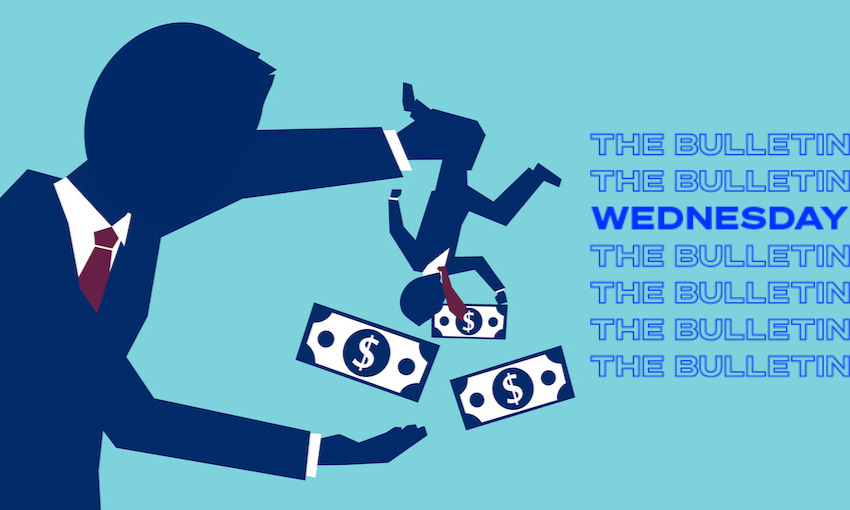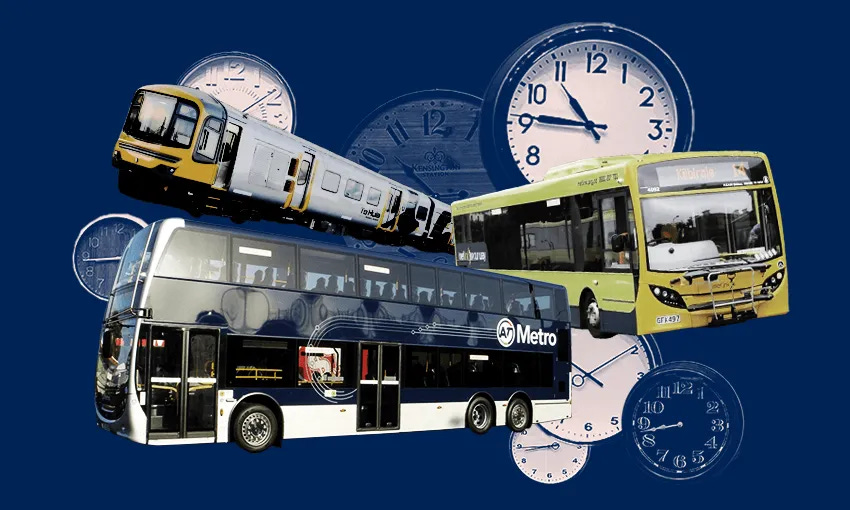“A tax system out of a Dickens novel”
Following last week’s furore over a poorly handled and wonky bit of tax policy, there's renewed energy behind the need to talk tax.
Mōrena and welcome to The Bulletin for Wednesday, September 7, by Anna Rawhiti-Connell. Presented in partnership with Z Energy.
In today’s edition: the lockdown that was the result of a government error; police vetting on the table for board of trustee candidates; efforts to curb youth offending; but first, the Big Fresh fruit guy makes a modest proposal on tax.
Is our tax system egalitarian or fair? (Image: Getty)
Let’s just copy and paste Australia's tax code
Tax. It’s everywhere I turn right now. Maybe an indictment of my reading habits, but that wonky bit of Kiwisaver tax policy from last week seems to have kicked off wider conversation about taxes. I’ll be honest and say that tax usually feels like a lumpy, complicated thing mere mortals aren’t meant to comprehend but instead are left to just grumble about paying. But I pay taxes and have done since I first started working, assembling inedible ham salads at the local Cossie Club. We all do. “Death and taxes” is a truth. That’s why I’m leading with Hayden Donnell’s accessible and funny piece on The Spinoff this morning where he proposes that we simply copy and paste Australia's tax code. I do not know if he is right but it’s not just a laugh – he makes several highly readable points and has experts to back him up.
Why should tax debate remain the domain of specialised experts?
Donnell freely admits he is “the guy who spent 2018 trying to get the Big Fresh Animatronic Fruit & Veggies to Te Papa” but why should tax debate remain the domain of specialised experts? A Herald opinion piece (paywalled) from actual tax experts yesterday on the Kiwisaver issue calls for “informed, considered discussions about what tax policy means for our collective futures”. It does also talk about “highly technical policy”. If you follow Bernard Hickey’s logic, having only these highly technical policies as a means for the government to generate revenue is indicative of 30 years of failure on tax. Hickey lays the blame at David Caygill’s feet for his “inability to complete the ‘pure’ trifecta of a simple, exception-free income tax”.
Earnings under $18,200 not taxed in Australia
One of the experts backing Donnell is economist Shambael Eaqub. We got him to run the numbers on importing Australia's tax code. One of the main features of that system is that earnings under $18,200 are not taxed. Donnell’s central thesis is that our tax system is not remotely egalitarian or fair and that it penalises our lowest earners. Eaqub agrees and thinks simply lifting Australia's income tax rates would be relatively affordable, including the $18k threshold of untaxed earnings. $3.3b to be exact. Eaqub argues the new system would reduce poverty and its resulting welfare and healthcare costs. Donnell and Eaqub aren’t alone in their tax chat. On Newsroom yesterday, Gareth Hughes was arguing for a reduction in GST. Economist Susan St John made the same call last week.
Urgent need for income tax brackets to be reviewed
As well as lending Donnell support, tax expert Terry Baucher (who once spent his precious and expert time trying to explain tax to me), took up his own tax cross yesterday. Baucher is calling for an urgent review of income tax thresholds or tax brackets. Baucher argues that tax brackets have not changed in more than a decade and that’s too long, especially in the current high-inflation environment where wages are growing, pushing more people into higher tax brackets. Baucher called the government’s reluctance to move the thresholds “plain cynicism”. Lifting income tax thresholds is, of course, part of the tax policy the National party floated in March and then got slightly muddled on. Never thought I’d say this but bring on the election year tax policies.
Trade Global markets on an award winning platform
CMC Markets is a trusted CFD provider, giving New Zealanders like you access to global markets. Trade the movements of more than 10,000 products including gold, Bitcoin, foreign currencies and more, all with competitive spreads and fast, automated execution. Download a free demo trading account and start trading today (sponsored).
Disclaimer: CFDs carry significant risks. Losses can exceed deposits. Consider CMC Markets PDS at cmcmarkets.co.nz
The 11-day lockdown in Northland was the result of a bureaucratic error
What’s done is done I guess, but the Herald’s David Fisher has the story behind the 11 day lockdown in Northland in October 2021. You may recall (or have blocked out) the news being dominated at the time by the story of three women who travelled from Auckland to Northland, prompting the lockdown. It was heightened by innuendo about gangs and sex work and the women were accused of using false information to travel across the border by then Covid minister Chris Hipkins. Official Information Act (OIA) documents reveal the cause lies with an error by a government worker after travel documents that were meant to be declined for the women were mistakenly approved. Unfortunately it gets worse. The OIA papers show the women had no links to gangs and weren't sex workers and that the mistake was known about three days before the lockdown was called.
Law and order announcements continue
Police and social development ministers Chris Hipkins and Carmel Sepuloni made a second announcement this morning about measures to curb youth offending and crime. The government is investing in a youth engagement package, including “wraparound support” for young people involved in ram raids. It follows Monday’s announcement on legislative amendments giving police broader powers to seize assets. National and Act have called the measures too little, too late, with David Seymour suggesting 11-year-old offenders could wear ankle bracelets. While soft on crime/tough on crime rhetoric is an age-old political jousting stick, the Herald’s Adam Pearse actually looked at one of the programmes being funded as part of the package to find it has had success. Youth worker Aaron Hendry has five recommendations on how to approach youth offending. Later today on the Spinoff, lawyer Andrew Grant makes his case for what could work as evidence shows that harsher sentences don’t.
This month we’re celebrating eight years of The Spinoff. We’ve come a long way since 2014 and that is in no small part thanks to our members – we literally wouldn’t be here today without them. Their generous support underpins all our work and has meant we are able to cover more areas of life in Aotearoa, to tackle more stories about our people and issues impacting our communities. From our ongoing coverage of inequality and the cost-of-living crisis, to political reporting and our focus on te ao Māori, it’s important mahi and we can’t do it without you. Let’s keep a good thing going - tautoko mai, donate today.
Police vetting being considered for board of trustee candidates
Education minister Chris Hipkins has confirmed that police vetting for board of trustee candidates is on the table. It comes after white supremacist and convicted criminal Philip Arps was able to stand for a seat on the board of Te Aratai College, one of Christchurch’s most multicultural schools. While that’s on the table, and Hipkins is treading carefully, it’s not yet off the table that Arps wins a seat on the board. There are five seats and as of Monday morning, fewer than 20% of school parents and caregivers had cast their votes on Monday morning ahead of today’s 4pm deadline. You have to wonder if this system is the best way to decide on who governs a school. Associate education minister Jan Tinetti has requested advice on intervening should Arps be elected.
Click and collect
Lockdown was good for the planet as newly released emissions figures for New Zealand cities show.
Backpacker who ate two minute noodles when he first visited New Zealand now runs a business here –a backpackers.
What you need to save for a comfortable retirement.
State Highway 1 south of Kaitāia was closed indefinitely in August after storm damage and residents are feeling ignored and forgotten.
Liz Truss is officially the prime minister in the UK after meeting the Queen and it’s looking like Jacob Rees-Mogg, who decried ‘climate alarmism’ will be responsible for climate change and energy.
Got some feedback about The Bulletin, or anything in the news? Get in touch with me at thebulletin@thespinoff.co.nz.
If you liked what you read today, share The Bulletin with friends, family and colleagues.
Transport agencies all agree more frequent services are essential – except, it seems, when it comes time to fund them. Suraya Sidhu Singh wonders why we're not doing the one thing that's proven to work. Claire Mabey grapples with the question of whether literary festivals in Aotearoa are as "doomed" as a recent Guardian article claims they are in the UK. Shanti Mathias introduces us to another terrible corner of the internet and explains the Kiwi Farms saga that's been in the headlines this week. Charlotte Muru-Lanning talks to comedian Janaye Henry about putting on what could well be the first ever all-wahine Māori stand-up show. And Chris Schulz talks to a guy who can sell you some of the world's best sea cucumbers.
Journalist tip-off leads to Football Ferns debut
This is a nice yarn from Stuff and a win for journalism. Former Australia international Indiah-Paige Riley made her Football Ferns debut in a 1-0 win over Mexico on Saturday. Coach Jitka Klimková confessed to not knowing Riley was still eligible to be selected for the New Zealand team until a Stuff journalist made her aware of it.
Oh and if you didn’t stay up to watch the cricket, Australia pulled off quite the win against the Black Caps. There’s always tomorrow. Literally - the next ODI starts at 4.20pm (NZT) tomorrow.
The Misery-Go-Round
The long read today is from Aaron Smale in North and South. It’s the September cover story and looks at Oranga Tamariki’s history of failure. Smale asks how an agency with such coercive powers, went so far off the rails. He also expresses little faith in the Oranga Tamariki Oversight Bill to hold the state accountable when it inflicts harm.











